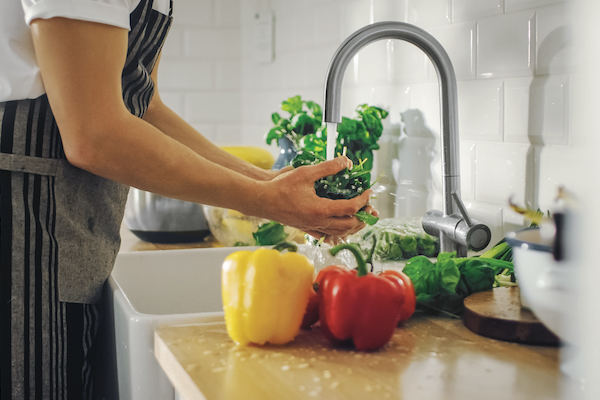Take Special Care with Food to Avoid Infections During Cancer Treatment
Some cancer treatments can make you prone to infections. When this happens, you need to take special care in the way you handle and prepare food.
Be careful to:
- Keep hot foods hot and cold foods cold.
- Put leftovers in the refrigerator as soon as you have finished eating.
- Scrub all raw fruits and vegetables with a brush and water before you eat them.
- Soak berries, as well as other foods that are not easily scrubbed, in water, and then rinse them.
- Scrub fruits and vegetables that have rough surfaces and peels, such as melons, oranges, and avocados, with a brush and water before you cut or peel them.
- Soak frozen fruits and vegetables in water and rinse them if you are not going to cook them (such as when using them for a smoothie, for instance). If cooking them, you do not need to wash frozen fruits and vegetables.
- Wash your hands, knives, and countertops before and after you prepare food. This step is most important when preparing raw meat, chicken, turkey, or fish.
- Wash your hands each time you touch raw meat, chicken, turkey, or fish.
- Use one cutting board for meat and another one for fruits and vegetables.
- Thaw meat, chicken, turkey, and fish in the refrigerator or defrost them in the microwave.
- Cook meat, chicken, turkey, and eggs thoroughly. Eggs should be hard, not runny. Meats should not have any pink inside. To be sure your meat, chicken, turkey, and fish are safe, use a meat thermometer and cook them to the safe temperature. To know what that temperature is, refer to a safe minimum cooking temperature chart, such as the one available at foodsafety.gov.
- Make sure your juices and milk products are pasteurized.
- Eat nuts that are shelled and roasted.
Do not:
- Eat raw fish or shellfish, such as sushi or uncooked oysters.
- Eat raw nuts.
- Use foods, condiments, or drinks that are past their freshness date.
- Buy foods from bulk bins.
- Eat at buffets, salad bars, or self-service restaurants.
- Eat foods that show signs of mold, including moldy cheeses like bleu cheese and Roquefort.
- Eat any perishable foods that have been sitting at room temperature longer than two hours.
- Eat leftovers that have been in the refrigerator longer than three days.
- Leave meat, chicken, turkey, or fish sitting out to thaw.
Talk with your doctor or nurse if you are not sure what to eat or how to prepare food during cancer treatment. Ask them to refer you to a dietitian. A dietitian is the best person to talk with about your diet. They can help you choose foods and drinks that are best for you during treatment and after. And give you tips on how best to prepare them.
For more information on how to find a dietitian, visit the Academy of Nutrition and Dietetics website at EatRight.org.
Source: National Cancer Institute
This article was published in Coping® with Cancer magazine, January/February 2022.


